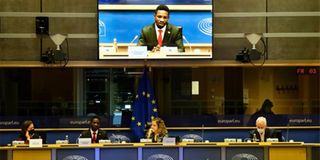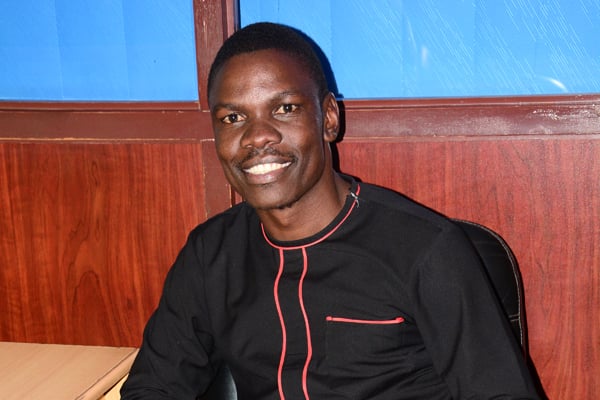Prime
Can Bobi Wine’s anti-Museveni campaigns in the West pay off?

Opposition National Unity Platform (NUP) party president Robert Kyagulanyi aka Bobi Wine addresses a group of Socialists and Democrats of the European Parliament on February 8, 2022. PHOTO | COURTESY
What you need to know:
- In the space of two weeks, two human rights special envoys from the US and EU have visited Uganda on matters of torture, arbitrary arrests and killings. But some political commentators say the visits are mere “exhibitionary ventures”, writes Derrick Wandera.
Two weeks ago, the internet in Uganda was awash with pictures of National Unity Platform leader Robert Kyagulanyi, alias Bobi Wine, addressing the European Union (EU) Parliament in Brussels, Belgium.
At the heart of his message was the call for the EU to stop funding President Museveni’s government which he has always described as “dictatorial”.
This was the umpteenth time the musician-cum-politician was asking the West to cut funding to the Ugandan government, especially money that goes to the security sector which he says has always been used against the citizens.
Beginning
Wooing the West by Bobi Wine has been a long journey that began since he emerged on the political space in 2017.
And following the August 2018 fracas on the eve of the Arua Municipality by-election to replace former MP Ibrahim Abiriga in which the Opposition politician and his team were brutalised, Bobi Wine grabbed international attention.
On September 6, 2018, Bobi Wine, who had travelled to the United States to seek specialised treatment for injuries he suffered during military detention, met US congressman Brad Sherman in an attempt to meet then US president Donald Trump.
Bobi Wine wanted to highlight “the human rights violations and repressions of freedoms” by the Ugandan government so that the US could stop funding National Resistance Movement (NRM) government that has been in power since 1986.
Multiple sources around Bobi Wine’s camp, who asked to speak on condition of anonymity, indicate that this is his strategy; to sever ties between Mr Museveni and his allies in the West so as to weaken the 77-year-old President.
“Bobi Wine wants to use his diaspora strength to his advantage following some of the successful activities the team has managed to organise in the past few years,” one of the sources says.
Courting the West
Bobi Wine arrived in the country last Friday night from Geneva, Switzerland, where he had been attending a conference on democracy and human rights.
At the conference, the former presidential candidate was given 10 minutes to speak about “how to topple a dictator”.
READ: Torture survivors petition UN to stop funding UHRC
Before his speech, the youthful leader treated his audience to his We are fighting for freedom song, before telling the conference that he was not representing himself, but Ugandans.
“I am here to tell the world with a clarity that Gen Museveni is not the leader you think he is. He is a threat to the people of Uganda. The international community already recognised that the 2021 election in Uganda was neither free nor fair. It is important that these words be followed with action,” Bobi Wine said.
Sources within government say this address angered some top officials, sensing the damage it could cause to the image of the country.
Information minister Chris Baryomunsi says Bobi Wine’s pursuit to have foreign aid cut is an unachievable goal and is not a sustainable mission for him.
“It is a shame that Bobi is telling the international community to cut aid to Uganda because that means you want to make Ugandans suffer. As a person who wants to be a leader, and you are talking like that, it means you are not fit for any position in this country,” he says. “But we are not bothered by his talk. The international community follows what is happening in Uganda.”
Accusations
Before, during and after the January 2021 general election, the country witnessed episodes of violence that left many Ugandans either behind bars, injured or even killed. Opposition politicians accuse security personnel of torture, arrests and killing of their supporters.
Between November 18 and 19, 2020, about 54 people were killed after sporadic protests erupted countrywide following the arrest of Bobi Wine in Luuka District. Government accused the presidential candidate of flouting the Covid-19 guidelines issued ahead of the elections.
In April last year, then Internal Affairs minister, Gen Jeje Odongo, said they had arrested 1,300 NUP supporters, but most of them had either since been released on court bail, or released without charges. But NUP insisted during a press conferences that many are still incarcerated.
To these incidents, Dr Baryomunsi says: “We owe it to Bobi Wine all the people that were killed. It is him that flouted the Covid-19 regulations and when he was arrested, his supporters went to the streets and engaged in criminality and wanted to kill police officers. They (police) also fought back and in the end, the people died. But this was all because of Bobi Wine.”
Course of action
NUP deputy spokesperson Alex Waiswa Mufumbiro says they are pursuing all avenues, including exploring options abroad to check NRM excesses.
“Uganda is a signatory to many diplomatic instruments which include peace and observance of human rights. But this is not anything that is seen in Uganda. People are tortured and killed while others are imprisoned. So our work as the Opposition is to provide the alternative voice,” he says.
In December 2021, the US Treasury Department separately slapped two Generals, former police boss Kale Kayihura and Maj Gen Abel Kandiho, then head of the Chieftaincy of Military Intelligence (CMI), among other military officers, with sanctions, accusing them of targeting individuals due to their nationality, political views or criticism of the Ugandan government.
Mufumbiro says, “We are yet to achieve more because at least the international community is getting to know who exactly Gen Museveni is. We have already petitioned international courts on these atrocities.”
In November 2020, even though he said the International Criminal Court (ICC) had acknowledged receipt of their petition to try President Museveni on abuses against humanity in Uganda, four-time presidential candidate Kizza Besigye called upon people who had evidence that pins government officials on abuse of human rights and extrajudicial killings to come forward.
Dr Besigye’s petition was followed by another complaint in the beginning of 2021 against President Museveni and nine security officials. The complaint, filed in The Hague by Bobi Wine, accused government of incitement to murder, abuse of protesters, and arrests and beatings of political figures and human rights lawyers.
Hope for Opposition
In the space of two weeks, two human rights special envoys have visited Uganda on matters of torture, arbitrary arrests and killings.
While on her benchmarking mission in selected African countries, including Uganda, mid last month the US Acting Assistant Secretary for Democracy, Human Rights, and Labour, Ms Lisa Peterson, urged government to act in the face of accusations of increasing cases of torture and forced disappearances.
A fortnight later, another envoy, the EU Special Representative for Human Rights, Mr Eamon Gilmore, visited Uganda.
“What I want to achieve is a situation where the human dignity of people in detention is respected. I want to see an end to people being tortured in detention, torture has no place in Uganda or anywhere in our world,” Mr Gilmore said.
Whether these meetings can deliver the desired change in the country, Mr Yusuf Serunkuma, a political commentator, says they can only make sense when President Museveni has left State House, calling the visits a mere “exhibitionary venture”.
“If these people in the West really respected human rights in Uganda, the November 2020 incidents would have acted as the biggest trigger point,” Serunkuma says.
In his view, the West is acting as brokers other than caring for the people of Uganda. “They can’t help because in the morning they are talking with Bobi Wine and in the evening they cross to the State House.”
But Prof Fredrick Juuko from Makerere University says although ties with the West may not be consistent, it will only be important if they are to be convinced that it is in their interest to address the human rights issues in Uganda.
“It is not Ugandans who created Uganda, it is them so they would like to see some stability. Bobi Wine will have to take it upon himself to prove to them that it is in their interest to intervene in what is happening,” he says.
Prof Juuko, however, warns of the risk it has on many Ugandans if aid is cut off.
NUP diaspora team
For the last one and half months, NUP members in the diaspora have been in the news for protests staged in Seattle, US, when former Speaker Jacob Oulanyah was flown to the hospital at a cost of Shs1.7b.
The NUP supporters say the money should have been used to build hospitals in Uganda and improving the health system of the country because not all Ugandans can afford to be taken abroad for treatment.
On many occasions, the NUP diaspora team which has chapters all over Europe and parts of the Middle East, has weighed in on pressing issues back at home.
The diaspora team has also been behind many of the invites Bobi Wine has received to speak at conferences abroad.
Some political analysts say it is in the interest of NUP to have a strong diaspora team if they will convince the West to buy into their narrative. Prof Juuko says NUP is taking steps in the right direction by having a strong diaspora team to deliver the message to the overseas political allies.
During their last annual retreat in Boston, USA, which brought together more than 1,500 people, the diaspora leadership invited some foreign government officials to speak at the conference.
“It’s being held because we want the world to know the human rights violations and atrocities that are being committed on Ugandans with impunity by the Museveni regime using the military and the police and all the other paramilitary groups,” says NUP diaspora leader Joel Ssemakula.
held in the City of Long Beach, California on August 12-14 and the theme of the event will be about the continued murder, torture, and imprisonment without trial of the NUP supporters, and the use of Kangaroo courts, like the General Court Martial.
“We will elaborate more about the torturing of citizens by the army. We want the world to know about the torturing of civilians such as [novelist] Kakwenza Rukirabashaija and [Kasese NUP coordinator Samuel] Masereka is sanctioned by the State.”
Ssemakula says the event will be graced by NUP principal, Robert Kyagulanyi Sentamu, as the chief guest.
Other party leaders, including the Leader of Opposition in Parliament, Mathias Mpuuga and NUP deputy presidents, the NUP secretariat team led by the Secretary General David Lewis, members of Parliament, human rights activists, and civil rights activists will attend.
But whether these meetings with Western leaders can translate to tangible action, enough to shake President Museveni’s 39-year hold on power can only be told by time.
READ MORE: NUP victories, failures one year later





